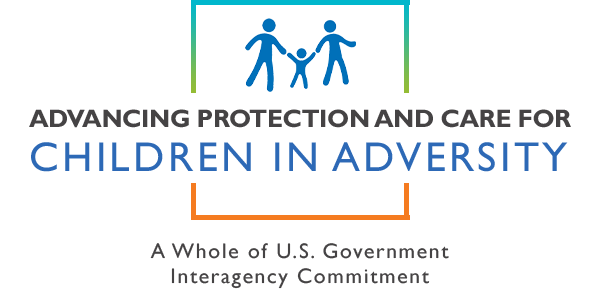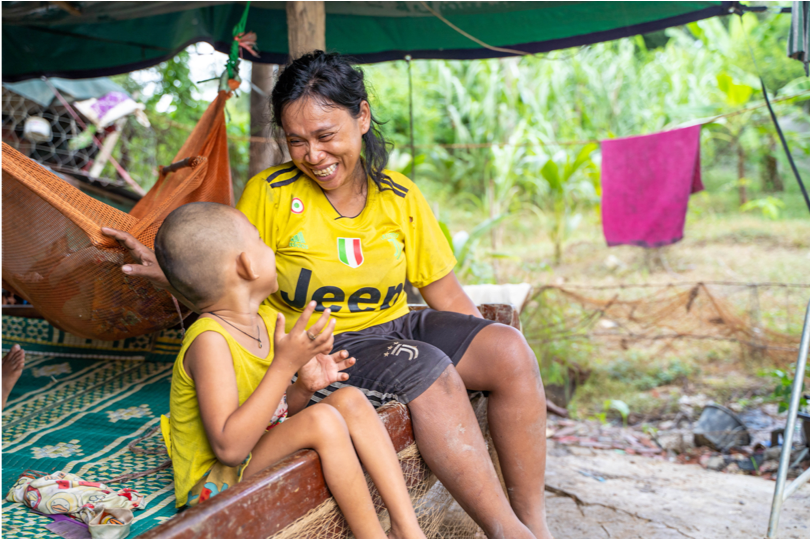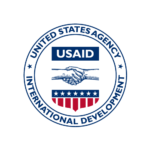Partner Spotlight
Family Care First/React: A Model of Exponential Impact
May 15, 2022

Sreyno and her mother
Kanika, once a good student, has become withdrawn in school and unhappy at home; Sreyno’s family seeks support to provide her with orthotic leg braces that will support her to walk independently; Samnang has needed guidance on rearing his children alone since his wife died; Although each of these families struggle with a unique set of challenges, they have found a common source of support through Family Care First (FCF)| REACT.
SHIFTING THE PARADIGM
Over many years, USAID’s Children in Adversity team has championed a dramatic change in approach that not only advises countries to shift from institutional care to family care as the preeminent solution for at-risk children, but has put the building blocks in place to see that objective through to fruition.
A concerted effort to bring that approach forward was officially launched in 2015 when Family Care First was initiated through a pilot program in Cambodia. Developed initially with funding from USAID, the program expanded with support from UNICEF, the European Union, Save the Children, and the GHR Foundation. Renamed FCF | REACT, the network connects small, local NGOs with international NGOs, governments, and universities that share a common purpose: to increase the number of children living in safe, nurturing, family-based care. Led by the Cambodian Ministry of Social Affairs, Veteran and Youth Rehabilitation (MOSVY) and facilitated by Save the Children Cambodia, the network now serves as the connective tissue for over 60 organizations throughout the country, all dedicated to supporting children in home environments where they can thrive within a family unit.
“The reason we stood up the Family Care First initiative in the first place was as a result of seeing these amazing pockets of innovative work in practice in Cambodia, including hyper-local organizations that had been operating on a very small scale. Our original vision was to find a more effective way to scale those efforts to improve the child protection system for children and their families in Cambodia.”
— Jamie Gow, USAID Children in Adversity team lead, who helped spearhead the effort.
One of the pioneers of the movement in Cambodia, Tara Winkler, moved 14 children from a residential care institution upon learning of corruption and abuse that were rampant in the facility where she had been volunteering. When Tara learned that the children were not actually orphaned, but rather separated from their families due to a variety of hardships—mostly economic—she dedicated her work to reuniting the children with their families and building a healthier home environment in which they could not only survive, but thrive. She founded Cambodian Children’s Trust (CCT) on that premise. Since the organization’s inception 14 years ago, its staff has laid the groundwork, not only for the children in their care to flourish, but for others within the Family Care First network to benefit as well by sharing their experience and philosophy of empowering those they are helping to have a voice in shaping their own futures.

Samnang and his three children.
“We believe empowerment should be a conversation about power. The people whose lives are affected by programming decisions need to be the ones making them. They need to have seats at the decision-making table and be the architects of the programs.”
— Tara Winkler, Founder, Cambodian Children’s Trust
A HOLISTIC APPROACH TO HELPING FAMILIES
Samnang and his three children have benefited considerably from that collective knowledge. When his wife passed away, Samnang was left alone to care for the children, ages 5, 7, and 16 years old, and conditions in the home quickly deteriorated. When CCT social workers became aware of mounting obstacles that put the children at risk, they worked in partnership with the father and members of their village to ensure his children would grow up in a safe and nurturing environment, rather than forcing them into an institutional setting.
CCT conducted an in-depth assessment using the Signs of Safety, an innovative strengths-based approach to child protection casework that integrates professional knowledge with local family and cultural knowledge to tap into the natural networks that already existed around the family and identify the areas where they could link into more support. CCT refers to this as their Holistic Family Preservation Model, which helps the family build and strengthen relationships with key people in their lives, and connects them to specialized services within their community.

Cambodia Children’s Trust Holistic Family Preservation Model for Social Work
Based on the assessment, they laid out a list of seven safety goals the family must address in order to thrive, from ensuring the children had food, pure drinking water, clothing, and study materials, to helping Samnang secure a steady job with adequate income and helping the older sister secure vocational training. The results of that intervention have netted significant progress through a comprehensive plan of action put in place with the assistance of CCT’s village-based social workers.
Rather than taking the children away from their father, CCT supported Samnang in becoming an integral voice in shaping his children’s futures, which is one of Family Care First’s key pillars—a focus on positive parenting and family strengthening.
“An investment in the family and family strengthening is what is going to help us achieve the core commitments that have been made in the APCCA strategy.”
— Jamie Gow, USAID
ECONOMIC STRENGTHENING + POSITIVE PARENTING
Shifting negative parental behavioral patterns was also a critical step in helping 11-year-old Kanika, who was struggling in school, withdrawn, and depressed. A caseworker from Children in Families (CIF), a local FCF | REACT partner, visited her at the request of the Commune Committee for Women and Children (CCWC) and determined the root cause of Kanika’s unhappiness was abusive parenting. Her mother, who was struggling to make ends meet after divorcing the child’s father, often hit Kanika and her siblings. In addition, the family’s living conditions were cramped and unhealthy. The caseworker conducted a full assessment and realized the children were at risk of family separation if action wasn’t taken quickly.
She began working with Kanika’s mother, Yin, coaching her in shifting to a positive parenting approach rather than using the punitive methods she was used to.
The caseworker also noted that the family was stuck in a cycle of poverty, exacerbated by the economic downturn wrought by COVID-19. So she turned to a second fundamental pillar critical to FCF | REACT’s programming: Economic Strengthening. CIF provided a monthly stipend, which allowed Yin to purchase chickens to raise as a way to augment her earning potential. A toilet was installed inside the home to improve living conditions and taught the family about proper hygiene. Yin found a job with the Forestry Administration office and is saving money to build a better home for her family.

Kanika reading
Kanika and her siblings are thriving as a result of these interventions. Kanika’s schoolwork has improved greatly and she has begun to interact more with others.
“Since we have CIF staff with us, my mom has changed, we are happy with this change, Mom becomes supporting, encouraging and protecting us instead of fighting and scolding. I commit to study harder and behave well in response to these changes from my mom.”
— Kanika, now age 12
COLLECTIVE IMPACT IN ACTION
One of the more unique aspects of this extended network is the level of collaboration it fosters among participating organizations. Implementing partners work hand-in-hand to exchange best practices and support children across the country with their collective knowledge, a range of services and skills they would not have access to otherwise.
This is particularly true for children with disabilities, like Sreyno, who has both neurological conditions and limited mobility after contracting spinal meningitis as a baby. As a result, Sreyno relied on her family to assist with daily activities, including carrying her when she needed to move. Consequently, she rarely went outside. In addition, extreme poverty and HIV stigmatized the family and proved enormous obstacles for Sreyno to hope for a healthy future.
Fortunately, that outlook changed significantly when FCF | REACT member Children’s Futures International (CFI) took on her case. One of CFI’s hallmarks is its emphasis on reducing service dependency and building self-sufficiency.
After conducting a thorough assessment, the CFI team sat down with the family and, with their input, developed a comprehensive plan to identify achievable goals, ensure Sreyno’s safety, and provide services that would ultimately lead toward long-term independence for both Sreyno and her family. They referred Sreyno to the Regional Physical Rehabilitation Centre in Battambang, where she received orthotic leg braces and physical therapy. As a result of accessing appropriate rehabilitation services, Sreyno’s mobility has improved and she has started to play more with other children.
“Now I feel I have knowledge on how to take good care of Sreyno and help her step by step and even how to get the right services for her. We are now able to remain living happily as a family together.”
— Sarien, Sreyno’s mom
CFI’s case manager is now working with the family to help Sreyno find transportation to school and to Safe Haven, a medical outreach facility that is also a member of the FCF | REACT network. Safe Haven offers a wider range of rehabilitation interventions, including teaching Sreyno’s parents further techniques to support her growing independence. COVID-19 has slowed that progress but the team will not be deterred, and neither will Sreyno, who has demonstrated great determination and resilience.
CFI is also helping the family attain sustainable employment, which will further their independence and provide funds to improve conditions in the home, making it a safer environment for Sreyno.
“CFI considers the best measure of success not to be the number of children the organization is working with, but the number it has safely and sustainably exited from its services,” said CFI Executive Director Lee Henley. “That is one of our primary objectives.”
The strategy appears to be working. Families who had once been separated by poverty or abuse are now learning to create their own solutions. “Through the collective impact of initiatives like FCF | REACT, we’re seeing real progress in the tools we have to help families cope with adversity so it’s no longer a threat to their existence, but rather a challenge that can be overcome,” said Rebecca Levy, Acting Special Advisor for APCCA.
THE DATA SPEAKS VOLUMES
The impact of this powerful network is clear, not only from the personal testimonies, but in the data itself: More than 11,768 children and 11,470 adults were directly impacted by FCF | REACT programs in 2021 with over 1.6 million total indirectly impacted. “It has been incredible to play a role in facilitating the collaboration between families, communities, local and international NGOs, government, donors, UN agencies and universities to strengthen the child protection system in Cambodia,” said Bianca Collier, Chief of Party for FCF | REACT at Save the Children. “The strong, active engagement of all actors is resulting in significant improvements for children throughout the country.”
As they weave together the practices of positive parenting, economic strengthening, cross-sectoral collaboration, and engaging both the family and the community in developing their own plans for success, the FCF | REACT network reinforces the fabric of the family unit, which must be strong and resilient if it is to provide vulnerable children with a healthy future. By working together, the partners of this remarkable network are breaking new and fertile ground from which the children in their care can flourish.
*The names of program participants have been changed to protect their privacy.







